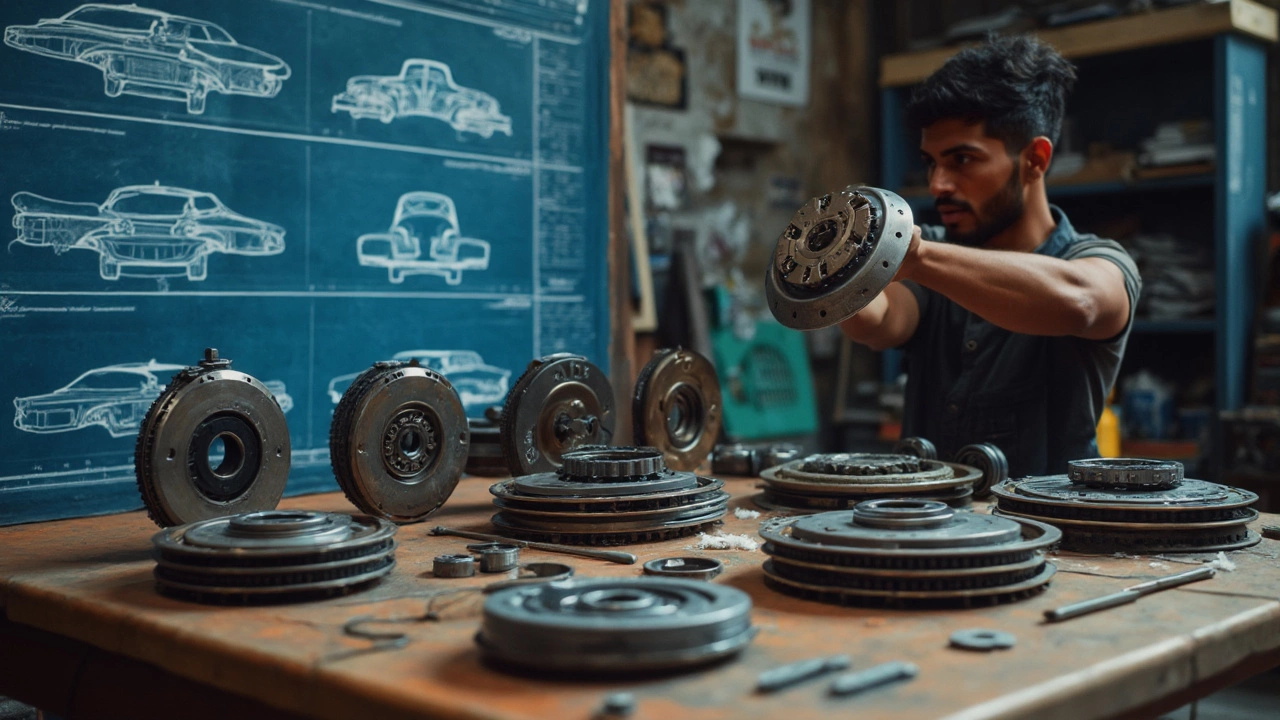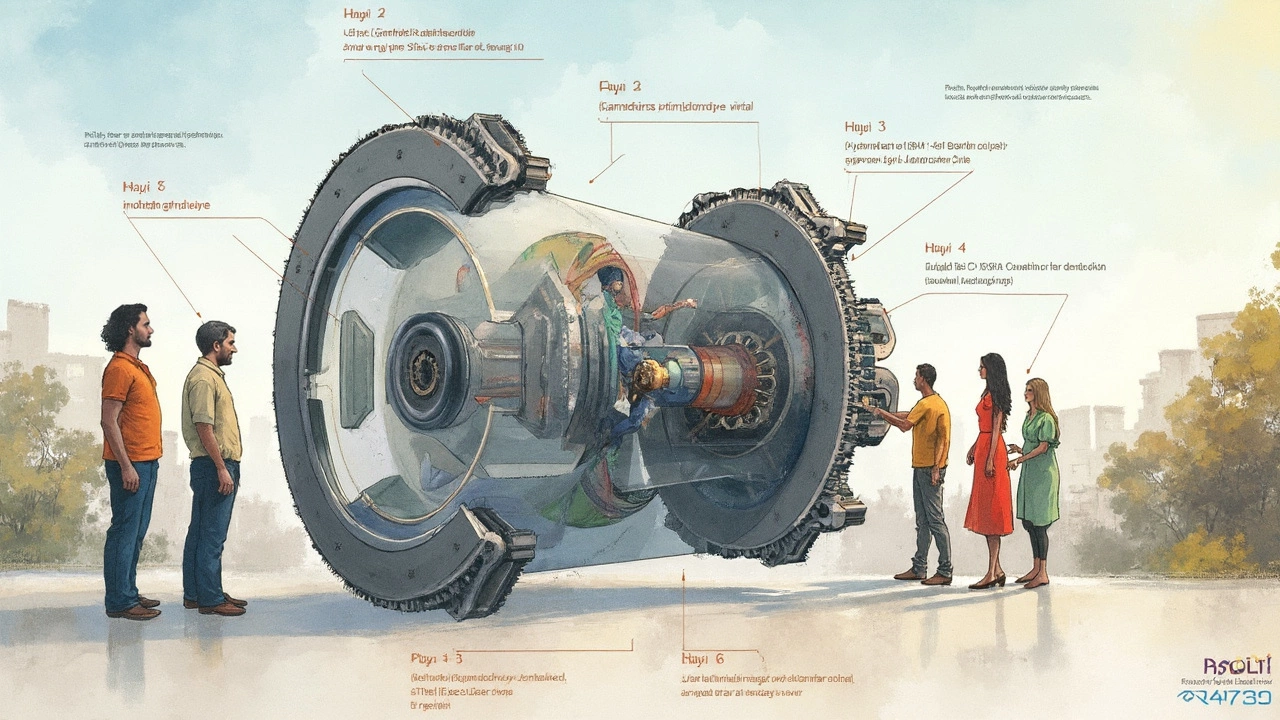 Feb, 11 2025
Feb, 11 2025
Picking the right clutch kit isn't just about heading to the nearest store and grabbing the first box you see. No way! It's about knowing your car and understanding what it needs. Let's face it, not all clutch kits are made equal, and not every kit will fit every vehicle.
First things first, you need to understand your vehicle inside and out. Each car has its quirks, and knowing the make, model, and year can guide you like a trusty GPS towards the right clutch. The adventure starts with your car's manual. Don’t have it? A quick online search can do wonders. Make sure you've got this info at your fingertips before making any purchase.
Ever considered what's actually inside a clutch kit? Well, it typically includes the clutch disc, pressure plate, and a release bearing. These might sound like complex parts, but think of them as the dynamic trio keeping your ride smooth. Some kits might offer additional pieces like a pilot bearing or alignment tool, so always check what's included.
- Understanding Clutch Kits
- Identifying Your Car's Needs
- Types of Clutch Kits
- Factors to Consider
- Where to Buy
Understanding Clutch Kits
Alright, so what's a clutch kit exactly? You might think it's just a bundle of parts thrown together, but it's actually more intricate than that. A clutch kit is essential for the smooth operation of any manual transmission vehicle. It's like the quarterback of your car's drivetrain, ensuring your engine and gearbox work in harmony.
The basic components include the clutch disc, pressure plate, and release bearing. Think of the clutch disc as the bridge between your engine and the gearbox. It's got to be tough because it faces all the action and friction. The pressure plate is its partner in crime, keeping things tight and ensuring the clutch engages and disengages smoothly. Then there's the release bearing, which acts like a mediator—whispering sweet nothings every time you press the clutch pedal.
Why Should You Care?
When your clutch kit begins to fail, it can lead to a hefty list of problems—including slipping gears or a burned-out clutch. You don't want that hassle, trust me. Regular maintenance and timely replacement of your auto parts can prevent these headaches.
Car maintenance isn't just about changing the oil or checking tire pressure. Paying attention to your clutch can add years to your vehicle's life. Swapping out a worn clutch might sound daunting, but understanding the basics could save you from unexpected breakdowns.
Statistics You Ought to Know
Did you know that a well-maintained clutch kit can last up to 100,000 kilometers? That varies based on driving habits and terrain. City drivers might find theirs wearing out faster. But don't worry, keeping an eye on these factors ensures you get the maximum mileage out of your kit.
Identifying Your Car's Needs
So, you're ready to find the right clutch kit for your car—awesome! First, let’s zero in on what your car really needs. Understanding these details will not only save you a headache but also some cash.
Check Your Vehicle's Make and Model
The type of clutch kit you'll need heavily depends on your car's make, model, and year. Compatibility is key! Cars roll out of factories with specific clutch systems tailored for their setups. Check your owner's manual or vehicle specs to ensure you're matching apples with apples when comparing kits.
Driving Habits Matter
Believe it or not, your driving style plays a significant role. Do you often find yourself stuck in traffic with a lot of stop-and-go? Or do you crave the thrill of driving on rugged terrains? Depending on how you use your vehicle, you might need something more robust than a standard clutch kit. An upgrade could be necessary if your habits lean towards performance driving.
Current Clutch Condition
How's your current clutch holding up? If you're hearing weird noises, experiencing slipping, or noticing a change in pedal feel, it’s time to make a change. Identifying these issues will make it clearer what kind of improvement you're aiming for with the new kit.
Special Requirements
If you've made modifications to your vehicle (like boosting engine output or changing the gearbox), these could affect the type of clutch kit you'll need. Keep these in mind to avoid any compatibility issues.
So, knowing your car's needs isn't just about what's under the hood! It's the perfect balance of manufacturer specs, your personal driving style, and any custom needs your car might have developed over time. This knowledge will help you avoid pitfalls as you choose the right auto parts.

Types of Clutch Kits
When it comes to picking a clutch kit, knowing the different types can save you from a world of hassle. Each type is designed for specific purposes, so matching them to your driving habits is key.
OEM Clutch Kits
If you're someone who prefers what the car originally had, then Original Equipment Manufacturer (OEM) clutch kits are your go-to. These parts are made by the same manufacturer that produced your vehicle's original parts. They fit perfectly, perform reliably, and maintain that stock feel. Good for regular daily driving!
Performance Clutch Kits
Thinking about taking your ride to the next level? You might consider performance clutch kits, specially crafted to handle more power. These are perfect for high-performance vehicles, like those modified for racing or towing. They provide better torque handling and can withstand greater stress.
Heavy-Duty Clutch Kits
For those who find themselves hauling hefty loads, a heavy-duty clutch kit is what you might need. Built to endure extra wear and tear, these kits are ideal for trucks, SUVs, or anyone driving in harsh conditions. They prevent slippage and ensure longevity.
Conversion Clutch Kits
Fancy swapping your automatic transmission for a manual one? Conversion kits are your solution, offering everything required for a seamless transition. But remember, it's not a DIY project—you'll likely need a seasoned mechanic for this one.
Choosing the right clutch kit can greatly affect your driving experience, so take the time to understand your needs and what each type offers.
Factors to Consider
Choosing a clutch kit isn't about guessing—it's about making based-on-facts decisions. There are a few critical factors to keep in mind when you're on this quest. Here's what you need to focus on:
1. Compatibility with Your Vehicle
Check and double-check that the clutch kit is made for your car's make, model, and year. If it's not compatible, you'll end up with parts that won't fit, and that's just a headache you don't need! A thorough understanding of your vehicle’s specifics will guide you to the right kit.
2. Driving Conditions and Style
Different drivers have different needs. If you're mostly cruising around town, a standard clutch kit might do the trick. But if you love off-roading or have a performance vehicle, you might need a heavy-duty or performance-oriented clutch kit. Your driving habits tell a lot about the best type for you.
3. Material Quality
Material matters, folks! Clutch kits come in a variety of materials like organic, ceramic, or Kevlar. Organic might be great for daily drivers, while ceramic offers better resistance and is great for high-performance needs. Each material has its perks and drawbacks, so choose wisely.
4. Brand Reputation
Stick to reputable brands that have proven track records in making reliable auto parts. A little research can go a long way. Online reviews and forums can give you insights from other drivers who have been in your shoes.
5. Cost vs. Value
Cost is always a factor, but it shouldn't be the only one. You don't want to skimp on something as critical as a clutch kit. Balance your budget with the long-term value you'll get from a quality kit. Consider the saying, "buy cheap, buy twice."
6. Warranty and Support
Never underestimate the importance of a warranty. A good warranty can be a lifesaver if something goes wrong. Plus, having solid support can make installation and troubleshooting a breeze.
Keeping these factors in mind will make your journey to choosing the right clutch kit a lot smoother. Happy driving!

Where to Buy
Alright, so you've narrowed down what you need, now the big question: where should you purchase your clutch kits? Well, there's a whole world of options out there, each with its own pros and cons.
Auto Parts Stores
These are the traditional go-tos for any car enthusiast. Think of places like AutoZone, NAPA Auto Parts, or even Canadian Tire here in Canada. The major benefit of these stores is the opportunity to speak with a knowledgeable staff member. They can help verify that the kit you’ve picked is indeed the right fit for your car.
Online Retailers
Welcome to the age of online shopping! Websites like Amazon, RockAuto, and CARiD offer a vast selection of auto parts, including various clutch kits. The benefit here is convenience—you can shop in your pajamas and often find good deals. Pay attention to shipping costs and return policies. You wouldn't want to end up with a part you can't easily return.
Car Dealerships
If you prefer OEM (Original Equipment Manufacturer) parts, buying directly from a dealership can be a solid option. You’ll likely pay more, but you'll have peace of mind knowing the part is tailored for your vehicle. Plus, they often come with warranties.
Local Mechanics or Specialist Shops
Sometimes the best choice is right around the corner. Local mechanics or specialty shops can source quality parts for you and even handle the installation. You won’t have to worry about compatibility or fitment issues.
Here's a quick comparison of buying avenues:
| Buying Source | Pros | Cons |
|---|---|---|
| Auto Parts Stores | Staff expertise, instant purchase | Limited availability |
| Online Retailers | Convenience, variety | Potential for wrong parts, shipping costs |
| Car Dealerships | OEM assured, warranty | Higher price |
| Local Mechanics | Professional advice, installation | May have markup on parts |
Whichever route you decide to take, just do your homework and make sure the seller is reputable. Trustworthy sources mean you’ll get quality parts and fewer headaches in the long run.